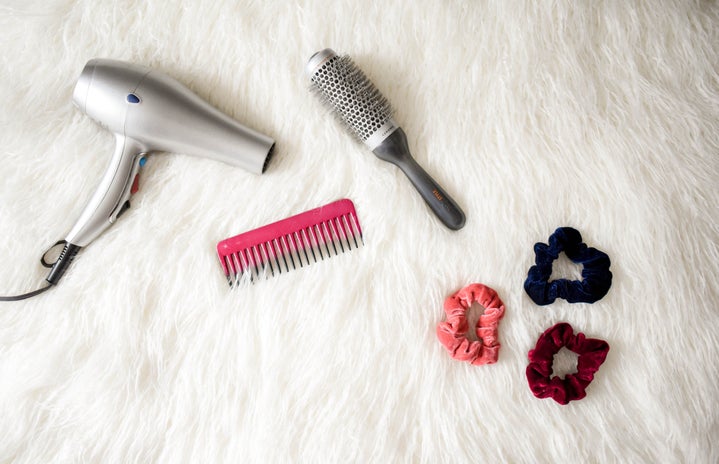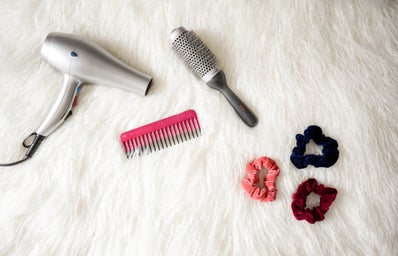A note from the author: This article comes solely from my personal experience, and I acknowledge that this experience is very different from those of women of colour. My opinion here is coming from a very privileged point of view because of the colour of my skin, and this is definitely something for our staff to be conscious about.
I remember the first time someone commented on the way I had chosen to style my hair. I felt the blood rush to my head, the burn in my cheeks as the words came out of my friend’s mouth: “Why do you straighten your hair? Do you not like it natural?” Although comments like this come from a place of love, usually from family members or friends, it doesn’t stop making my blood boil every time. I feel the burn of shame as they make these comments, feeling judged for not being comfortable and accepting of my “natural self” or loving my curly hair that so many of my straight-haired friends are desperately jealous of.
First things first, I love curly hair. The bounce, the body, the little ringlets that appear as I step out of the shower or walk my way back to shore at the beach. As a little girl, I loved being one of the only ones among my friends who used my mother’s “fancy” hair products filled with jojoba oil and keratin to calm my frizz and structure the beautiful curly-cued locks. I remember loving my curly hair while it was long and luscious, growing down my back. I also remember the first time I realized curly hair is a lot of work.

My naïve 6th-grade self asked my hairstylist to chop it off up to the bottom of my ears. The curls had no weight, were uncontrolled and untamed, covering my face and refusing to stay in a ponytail or headband. Getting up in the morning usually involved a crazed tantrum as I realized there was no way to get my hair ready for school and make my morning ride. I would look at other girls in my class with their carefree silky, shining heads, making jokes about how they rolled out of bed this morning and hadn’t brushed their hair in days. They would throw it in a ponytail, braid it, or let it free to have other friends play and arrange it during carpet time. I sat there, petrified at the thought that anyone would so much as bump my head and set chaos to my carefully arranged and oiled down mane, whose ponytail stuck out in every direction.
As I matured, so did my relationship with my hair. I began to realize that life was not all that great for my straight-haired friends either. For one, their hair always looked the same. Most of them couldn’t shape it into anything without it hanging limp after a few minutes, even with the 375-degree heat of a curling iron. I began to love that I could have my hair straight one day, curly the next, or wavy after a few days of humidity getting into my straightened locks. Yet just because I had realized these things, it didn’t mean that I wanted to leave my hair natural all the time.
I loved how I could straighten or blow-dry my hair and leave it for a few days of stress-free hair care where I could roll out of bed, brush it and throw it up or leave it down, never having to get it wet and style the curls in advance. I loved how it worked with most outfits I wore and made my medium length hair (which was still growing back from the 6th-grade chop) look longer than it did curly, which usually took off an inch or two. Because of these personal preferences, I began a blowout routine, getting my blow-dryer or straightener out a few times a week to get it ready for the next days of school or work.
None of these beauty decisions had anything to do with my friends or family or how I acted or treated them. Yet so many people took it as a personal offense. My curly-haired friends asked me if I thought their hair was ugly because I “disliked’ mine. My straight-haired friends scoffed at me, acting like I was ungrateful for my hair’s body and changing personalities. Family members and family friends told me I had “changed” and was not the carefree child anymore who wore no makeup and left my hair natural and wild. They took my actions towards my hair as a change in the deepest parts of my character, values, and personality.
So, what is the point in commenting on women’s hygiene and beauty habits? Does it make us better people or better friends? Is it constructive in any way? Absolutely not.
My hair-care preferences are just mine. They are not a statement against straight hair or curly hair. They are not a direct reflection of the person I am or the way I take care of my body. For me, they are how I feel comfortable, consistent, and sane as I get ready for each day. They are how I personally feel most confident at this time of my life. They really are not that big of a deal. They are also nobody’s damn business.




